In last week’s column, we left off with the early spread of barbecue through the New World. Barbacoa is “discovered” by European settlers, who see it in action courtesy of the native tribes of the Caribbean. Discovering they liked the food prepared with smoke and a low-heat wood fire, the travelers kept sailing to North and Central America, bringing it with them.
The British colonists, in particular, developed a love of the style and it could be seen from all the way up in Massachusetts and Maine. There are records showing barbecues — large gatherings with a big, smoky roast — in Salem, Boston, and elsewhere. A celebratory barbecue was held after the French and Indian War in Falmouth, Maine, in 1759.
Slowly, the tradition of barbecue established itself in Virginia for one really big reason: pigs. This particularly hearty livestock was easy to raise and grow, having arrived in Jamestown as early as 1607 and ballooning to a massive number in just a few years. Because of all this, they were a very easy source of meat for the colonists, and they became the ideal protein for the young settlements. With the barbacoa style in hand, they would soon learn to perfect this smoked and roasted form of cooking.
With the cultivation of tobacco as the primary cash crop of the Virginia colony, things began advancing rapidly, and slavery would explode as a means of accomodating the large, developing plantations. Over time, plantations in the South became the source of large gatherings — voluntarily for white landowners and by circumstance for the black slaves. Barbecues started as parties for large family and friend gatherings, but as America slowly began to transform from an idea into a nation, the social events became formal institutions in the American South. Whites would gather and feast and socialize, but often it was the black slaves who would do all the cooking, which gave way in large part to the very heavy influence of African American cooking in the practice of barbecue as we know it.
However, as it seems like so many things do, these formal social gatherings transformed into political events, with political campaigns hosting them to win over supporters. Via Robert Moss’s Barbecue: History of an American Institution:
Over time, the barbecue became part of the political sphere as well, and it was in Virginia that the first campaign barbecues were held. Election days in colonial Virginia were infrequent, occurring whenever the governor dissolved the Assembly or a member quit or died. Each county was allotted two seats in the House of Burgesses, the only real elected body in the colony. To choose their representatives, eligible voters would gather at the county courthouse, coming into town in wagons and on horseback from miles around. Elections were usually held on court days, when many men would already be traveling to the county seat to conduct business such as buying and selling land, slaves, and supplies.
[…]
The practice of “treating” – plying voters with liquor and food – was widespread, and though practiced discreetly, it became an indispensible component of a campaign.
There would be a lot of alcohol, sweets, and (of course) barbecued pigs, creating the very first political barbecue events.
Even George Washington, in an early political campaign in Virginia’s House of Burgesses, is said to have spent a lot of money on alcohol for one of these events. They were expensive to host, but eager politicians in this time period were wealthy, white landowners. They had the money.
In what Moss calls “a curious mix of artistocracy and democracy,” these Virginia barbecues were the place for the haves and the have-nots to come together over a common cause (politics), and everyone felt secure that the “consent of the governed” had been appropriately claimed in their representative government.
But, while Virginia is not as well-known for its barbecue today, their practice of it traveled to and inspired one of the most politically divisive barbecue rivalries in American history: The Carolinas.













